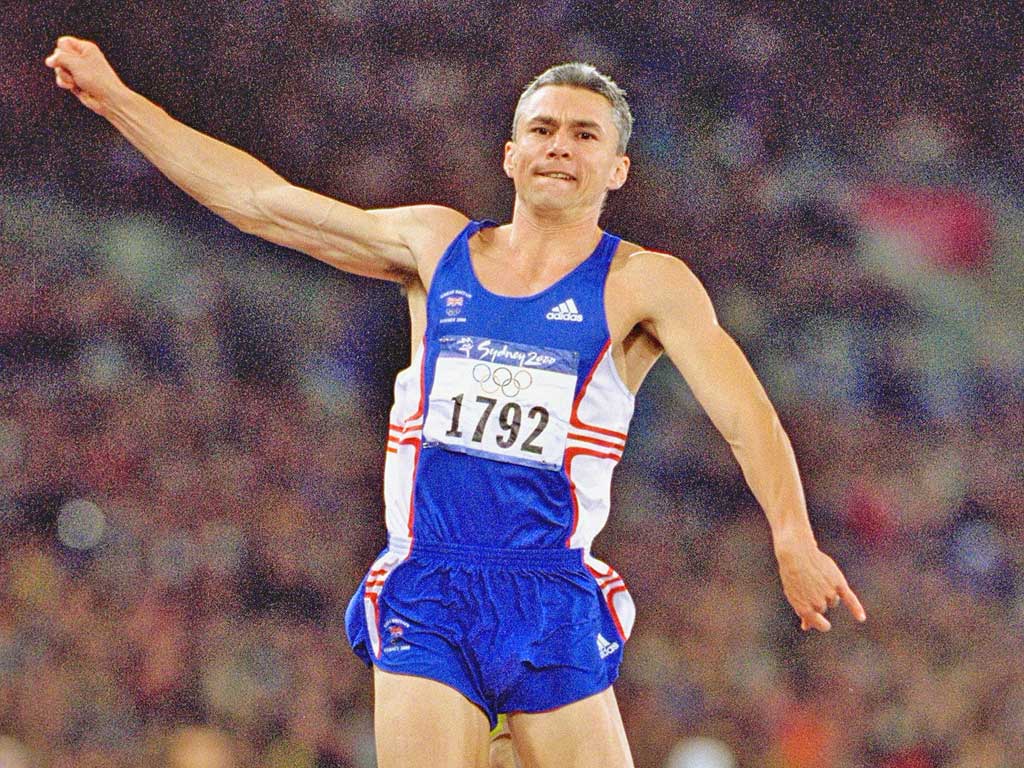Jonathan Edwards: 'The overriding emotion was not of happiness but relief'

It was 8.10pm before I finally took to the track for the final of the triple jump at the 2000 Olympic Games in Sydney. For the entire day, I'd been trying to kill time – speaking to people at home, having a snooze... anything I could do, really. I'd never have thought that training as a youngster at West Buckland School, in Devon, would have led to this moment. But here I was.
There was a pressure on me in 2000 because I knew in all probability, at the age of 34, it would be my last chance to win gold. This did tighten the screw a little for me because I knew that if I didn't do it then, I never would.
Building up to the big moment was excruciating and nerve-wracking, but for some reason as soon as I actually got on the track, it was fine.
I felt in good shape and throughout the event I had it in my mind that whatever anybody else jumped, I could go further. I just knew it. I was the world record holder. I was the first man to pass the 18-metre mark. I had set it twice at the World Championships in Gothenburg five years earlier, first with 18.16m and then 20 minutes later with 18.29m. I knew I would do what I needed to do.
My winning jump came in the third round. I remember standing on the line and this feeling came over me that this was going to be the one. If you look at the footage you can see I give a little smile. Cuba's Yoel Garcia recorded 17.47m, Denis Kapustin leapt to 17.46m, but they never really came close to my third-round jump of 17.71m.
I was so emotional after the final, which is strange because I'm not normally like that. However, if I'm totally honest the overriding emotion wasn't one of happiness but of relief. In fact, there was no great joy at all. Because of what had gone on before, because people were expecting me to become the champion, the win just created this huge release because, suddenly, I had done it.
And, just as importantly for me, I didn't have to deal with the question of "What went wrong", like I did in Atlanta in '96. Back than I had to settle for silver – Kenny Harrison, of the United States, won with a leap of 18.09m. In 2000 I hadn't won a global title for five years. I was the favourite, but then I had been the favourite for the last four or five years. And this was the Olympics, there had been that extra tension to come away with a gold medal
And now, at last, it was job done, because I had finished what I wanted to achieve. In fact, I had achieved more than I ever thought I would when I started out learning the long jump and the triple jump. I was a world record holder and an Olympic champion.
At the time, I was inspired by faith. It was the bedrock of my life. It was a time of intense stress and it focused my mind. Once I retired, I began to ask questions I'd never asked. But that is part of my journey and part of the Olympic win, which has brought me so much more than just a medal.
Jonathan Edwards will be part of the BBC commentary team for this year's Games.
Britain's greatest triple jumper in numbers
2003 Announces his decision to retire after that year's World Championships in Paris, a decision he says was influenced by God.
18.29 World record jump in metres at the 1995 World Championships
17 The number of years his world record has remained unbroken.
2 Amount of times he beat his own world record in 1995 in Gothenburg.
This series is being run in conjunction with Richard House Children's Hospice, which is based in the Olympic borough of Newham. It caters for children with life-limiting, life-threatening and complex healthcare conditions. To find out more and to vote for your favourite British Olympic moment, visit www.facebook.com/richardhousech
Join our commenting forum
Join thought-provoking conversations, follow other Independent readers and see their replies
Comments
Bookmark popover
Removed from bookmarks